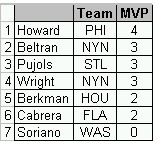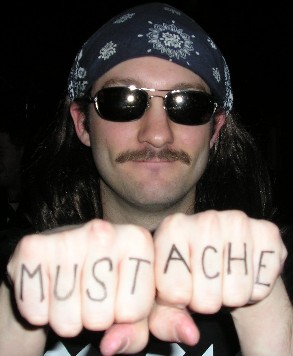
I've been delaying putting this information up until I could make it all pretty, and write a comprehensive explanation of what I think it all means. But apparently I'm too busy/lazy to do that, so fuck it -- here it is.
The best way to determine who the most valuable player is, for a given team, is to look at how many
Win Shares they generate. Win Shares aren't perfect, obviously, but they do take into account both offense and defense. By this criteria,
Albert Pujols is your MVP, closely followed by Carlos Beltran
But you can't just look at raw totals. I think it makes more sense to look at
Win Shares Above Bench, which takes into account the difference in ability between Joe Superstar and Jerry Benchwarmer. Basically, even a terrible player is going to accumulate
some win shares. What makes a star a star, is how much more production you get out of him than you do from a
replacement-level player for that position.
By that criteria, your MVP is
Carlos Beltran. Finding a center fielder who can bang 40-plus homers is a lot harder than finding a first baseman who can do the same, so Carlos gets the nod over Albert by this measure. And frankly, I think that this is what makes the most sense. By WSAB, Ryan Howard doesn't even crack the top five.
But WSAB is a nerd stat that nerds use when they aren't obsessively updating the
Buffy entry on Wikipedia. So lets look at some caveman stats, like RBIs, Strikeouts, and Runs. It seems to reason that the most valuable player would provide the greatest percentage of his team's production (or, in the case of strikeouts, the
least amount, because Strikeouts Are Bad, You Can't Move The Runner Over On A Strikeout, It Isn't A Productive Out). So how does Ryan Howard hold up as an MVP candidate here?
Not very well, it turns out. Ryan knocked in 149 runs, and that's a lot. But he played on a very good offensive team in a tiny little bandbox of a park -- lots of guys on that Phillies team knocked in a bunch of runs. Ryan Howard knocked in a smaller percentage of the team's total runs than both Albert Pujols and Lance Berkman. Hell,
Fatty Kruk knocked in 13 fewer ribbies, but provided almost 20% of the shitty Houston offense. That would make it seem like Berkman is the more valuable player than Howard.
So, combined with Win Shares, I ranked the top seven players in the NL and gave them each a point for their ranking in these categories (7 points for coming in first, six for second, etc) and this is what I came up with.
Apparently, I will have to fire up a second post to contain all this MVP wisdom. Continued above.







